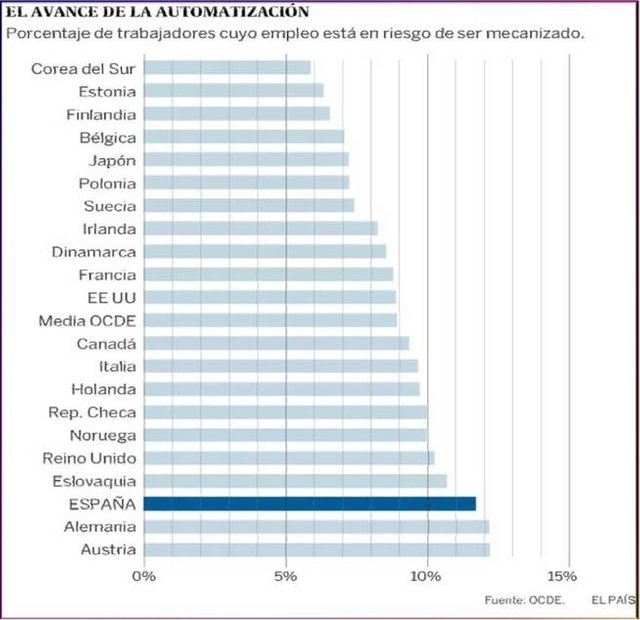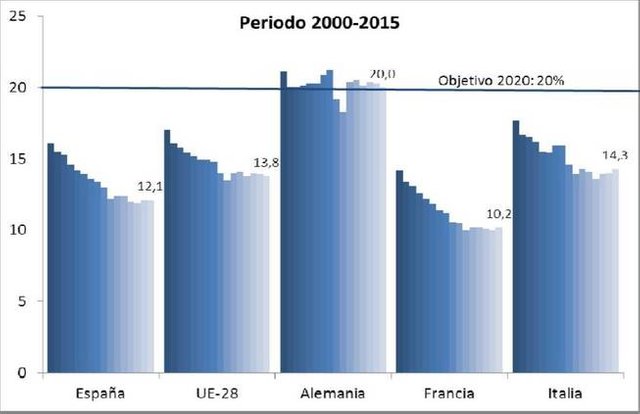The intensive use of robots in the production system is threatening thousands of jobs. Up to 43% of the jobs can be replaced by machines.
The fourth industrial revolution is here. And with it, a new more mechanized economic and employment landscape in which robots and generally, artificial intelligence are called to occupy an increasingly important role in the production system. To the extent that three of every four jobs will be related in the not too distant future with computer systems, data management and computer security.
Not only in the industrial sector, also in services, increasingly linked to technological advances. Although, if before scientific progress was able to create employment for medium and long term after an initial shock (substitution effect), today those expectations have been truncated.
And that is what is already happening in Spain and other advanced countries. But if in economies with higher professional qualifications the labor market is able to adapt to the new industrial ecosystem in countries with poor human capital, the negative impact of robotization be much higher. At least the Luddites, those British craftsmen who rebelled in the nineteenth century with the first industrial revolution, have not yet made an appearance.
Those professions where human interaction and creativity are more important (family doctors, musicians) are those that are more protected
According to estimates of Studies of CaixaBank, 43% of jobs currently existing work in Spain has a high risk (with a probability greater than 66%) it can be automated to medium term, while the rest of the posts work are divided equally between the medium-risk group (between 33% and 66%) and low (below 33%).
And what positions are most threatened job? A study published by professors Carl B. Frey and Michael A. Osborne, University of Oxford, believes that technology is now able to automate even skilled occupations, while those in which human interaction and creativity have more important (family doctors, musicians) are those most protected. According Adrià Morron Salmeron, author of a study of CaixaBank, accountants, financial analysts and economists are among qualified professions that competition may suffer more machines.
most affected countries
A recent report by the Organisation for Economic Co-operation and Development (OECD) placed Spain, Austria and Germany as the countries most affected by the robotic revolution. Specifically, the fourth industrial revolution force to replace up to 12% of employees in these three countries, compared to an average of 9% in the OECD. For Germany, with one of the best education systems in the world, it has to do with its huge exposure to the industry, which in the long term makes it more vulnerable to its labor market.
As says a report by the Federation of Industry of CCOO, which has launched an ambitious debate in the union on the effects of mechanization and robotics in the workplace, the "manual and repetitive" jobs are those which are most likely to be replaced by machines, although this will occur via a very slow process.
The problem arises not so much for the qualification of labor but affect very recurring jobs. Thus, while in Austria the workers are more prepared than in the US, however they perform repetitive tasks, thus affecting greater penetration of robotics, rather than the educational level of the workforce.

Fuente: CCOO.
As the study authors argue CCOO, new industries offer fewer jobs for unskilled and underqualified workers. That is, the jobs eliminated because of automation are not covered by the magnitude and speed with which technological change occurs, and whose acceleration is unprecedented in the recent history of the economy.
Some studies have estimated that between 40% and 50% of workers with education levels elementary or secondary school suffer competition from automata, while professional with a master's or a doctorate will almost equal zero probability of being replaced by a robot.

Fuente: CCOO.
The union report Ignacio Fernandez Toxo, in line with the analysis that make other experts, dismantles the idea that only some workers may be affected by the increasing mechanization. And in this context, that previously thought that jobs affected by automation would be less qualified, but now the robots also replace jobs intermediate knowledge such as health, transportation and administrative tasks, as they are based on the routine . And the production process can be replaced by machines.
CCOO cites a work of Professor Salvador del Rey, Professor of Law, which estimates that the cost of creating a robot will fall by 20% next year, while its yield increased by 5%. But while people double their productivity every 10 years, robots, at least they do every four. Without forgetting that the payback time of a robot was 5.3 years in 2015 and 2025 it will be reduced to 1.3 years.
'Big data' and robotization
Currently, 8% of jobs are occupied by robots, but in 2020 this percentage will rise to 26%. Robots also be increasingly autonomous and able to interact and execute and make more complex decisions. Thanks to the 'big data', robots now have a formidable database that allows them to experiment and learn which algorithms work best.
Something that explains that the "productive delocalization" associated with globalization in search of cheap labor, is passé. As the report says CCOO, for decades, large companies have relocated whole plants emerging countries to reduce production costs. But the fast pace of technological development can now replace labor with capital (machines), favoring employment in advanced economies, where there are higher professional qualifications and legal certainty. In addition to more stable political and social frameworks. Precisely as a result of digitization, robotics and 3D printing.
Weight of manufacturing in GDP in the EU, 2000. (Source: Eurostat)
Weight of manufacturing in GDP in the EU, 2000. (Source: Eurostat)
A World Economic Forum estimated that by 2020 will disappear 7.1 million jobs in advanced countries and 2.1 million were created. Technological progress is such that a study by McKinsey estimates that today could automate 45% of existing jobs in the US.
The truth, as experts say CaixaBank, is that in recent decades, reducing the cost of computers has led to replace workers with intermediate skills, who performed repetitive and easy to specify in an algorithm tasks, which has contributed to the polarization of the labor market and increased inequality.

Fuente: CCOO.
This leads, says economist Adrià Morron, another important economic aspect: the distribution of new wealth. According to his data, there is a negative correlation between the probability of automation profession and their average annual salary, "suggesting a possible increase in inequality in the short term."
The problem is not the number of jobs lost to automation, but occur enough to offset the loss of jobs caused by the digitization. In the past industrial revolutions, new industries hired more people who lost their jobs in companies that closed not to compete with new technologies. "In the economy, has been going a process of industrial mutation that incessantly revolutionizes the economic structure from within, destroying it and then create a new," the authors of the report say CCOO. The famous 'creative destruction' of Schumpeter. But with less employment.
The biggest source of job losses is legislation. In many cases, the legislation forces businesses to automate. The sad thing about all this and especially the fearmongering left-leaning economists is this concept of 'technological unemployment'. It is nothing new, new technology always pushes some people out of work for a while. But the reason for so many people especially under the age of 30 being unemployed has nothing to do with automation directly, rather, the simple fact that minimum wages do not cover the productive capacity of the newer workers. They never get a foot in, and many just give into the push to study, and end up in their 40s with masters degrees and no experience in anything, maybe still living with their parents.
In effect, what I think has to happen is that a lot more, and circumstances will drive this, will choose to live in the grey or black economies. In some parts of the world this is already the norm, and is caused by overt corruption of the government. The opportunity cost of illegal or grey area work, or just simply dodging taxes, in these places, is lower than the risk of getting into trouble.
In the long run, the biggest problem is the growth of government not only consumes part of the productivity of the population, and increasingly so, it also drives more and more market activity into a dangerous place where increasing numbers of people find themselves having to go because the fences have been raised against either their particular productivity level, experience, or even industry, in some cases, and not even at all by technological advances.
If it was just about technological advances, we should be massively richer as a society by now. Sure, 1 man can do the job of 10 with some new machine, but over the following 5 years someone finds a way to train and employ these other 9 and their productivity rises to the same level as the lucky first guy. This increased wealth leads to spending which leads to more wealth, and so on.
What we are seeing in the world today is going the opposite direction. We should be and effectively are more wealthy than ever in history but governments and the special interests that capture it, have sucked out most of the gains.
Downvoting a post can decrease pending rewards and make it less visible. Common reasons:
Submit
What happens when they become more intelligent than us in 14 years.
Downvoting a post can decrease pending rewards and make it less visible. Common reasons:
Submit
The problem is that the rich control them not the population. Everybody could easily just work 3-4 hours a day on average and get more than we do now. The only thing that needs to change is that we give most of what we produce to the rich.
Downvoting a post can decrease pending rewards and make it less visible. Common reasons:
Submit